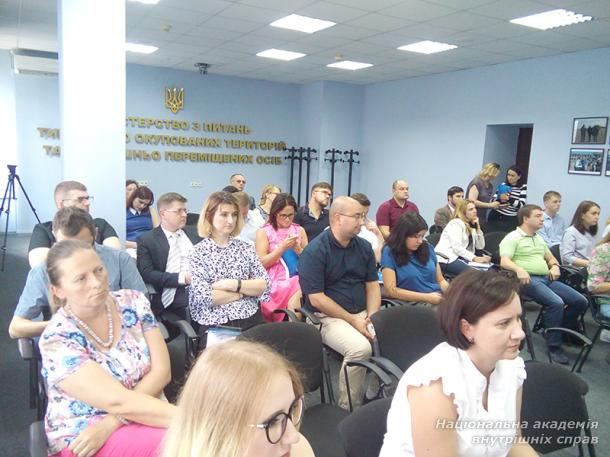On July 4, 2019 research results of the project “Ukrainian frontier: challenges for Zakarpattia and Pontic littoral” were presented. They were related to current threats in the multicultural polyethnic regions, in which there is a high risk of intensifying conflictogenity due to external and internal factors that form regional security environment.
In his greeting speech, the Ukrainian Minister of Temporarily Occupied Territories and IDPs Vadym Chernysh informed participants of the event, that the project was initiated by the non-governmental organization “Center for International Security” (CIS) and the National Institute for Strategic Studies with support of the Representative office of Konrad Adenauer Foundation in Ukraine in frames of the project “The EU Neighborhood”. The Minister illuminated the work of this project, announced results of its preliminary work related to limitations on destructive influences and improving the quality of governance on the level of communities, local and central authorities. Also he thanked the Federal Ministry of Education and Research of Germany for financial aid, given during March-June 2019.

Kostyantyn Kononenko, deputy director of the National Institute for Strategic Studies remarked while pointing out the project’s aim, that during April-May 2019 representatives of CIS and Konrad Adenauer Foundation in Ukraine investigated problems of regional centers in Zakarpattia Oblast (Mukachevo, Berehove, Khust), Mykolaiv Oblast (Pervomaisk, Yuzhnoukrainsk, Ochakiv) and Odessa Oblast (Podilsk, Bilhorod-Dnistrovskyi, Bolhrad).
The results of this investigation were presented by the project representatives Valeriy Kravchenko (senior associate of the National Institute for Strategic Studies), Oleksandra Davymuka (junior research associate of the National Institute for Strategic Studies) and Andriy Karakuts (first deputy director of “Center for International Security”). In order to regulate regional problems, they developed recommendations directly related to respective regions. Aside of ecological, ethnical and social aspects, the focus of attention was directed toward the problem of separatism. In order to fend off political destabilization in Ukraine, specific measures, aimed at limitation of its manifestations, were pointed out.

The following members of the National Academy of Internal Affairs took part in the work of the round table: Volodymyr Shcherbatiuk (professor of the Department of Legal History), Victoria Kazmirenko (assistant professor of the Department of Legal Psychology) and Denys Tykhomyrov (doctoral candidate of doctoral and military postgraduate studies).
Gabriele Baumann, head of Konrad Adenauer Foundation in Ukraine, expressed concern over considerable amount of Ukrainian citizens that work outside Ukrainian borders, and not in Germany alone, but also in Poland and Czech Republic. The following situation is for Ukraine problematic. “We need to discover the real roots of this problem, – continued Gabriele Baumann. – We need to answer the question: “Why is it so?” “What can be done for Ukraine to make it politically and economically more stable?” For this reason we should take into account regional problems in Ukraine, including problems in Zakarpattia Oblast, Mykolaiv Oblast and Odessa Oblast.

